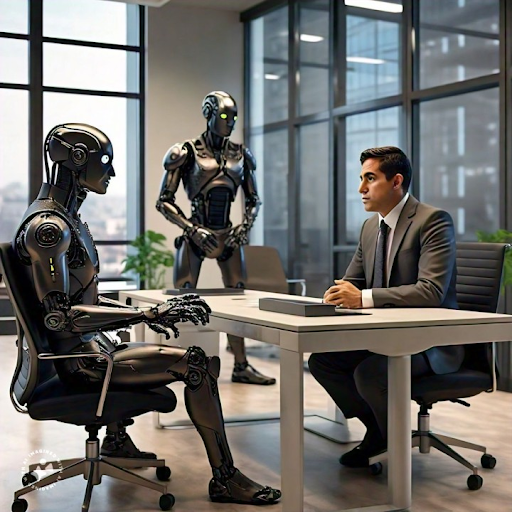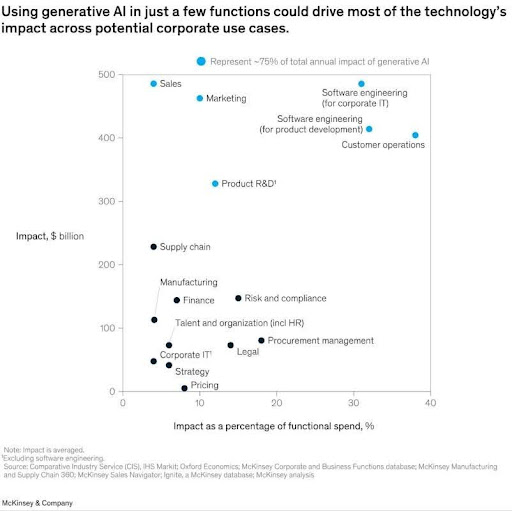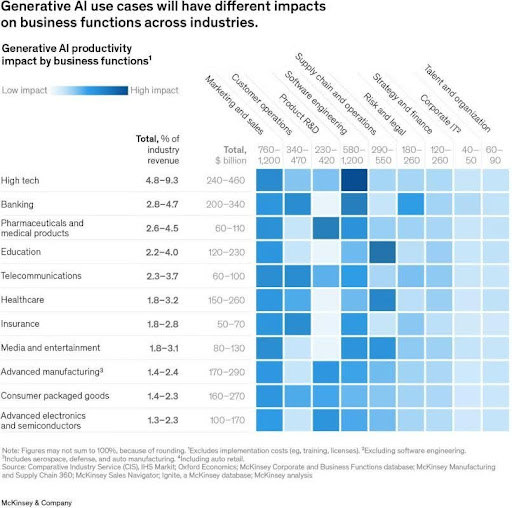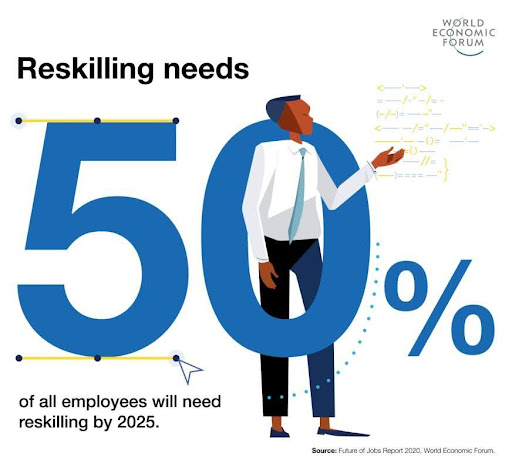
In the realm of technological advancements, few innovations have sparked as much debate and speculation as Artificial Intelligence (AI). According to a report by the World Economic Forum, despite fears of widespread job loss, reports suggest AI will create 58 million new jobs by 2022, offsetting the potential displacement of 75 million jobs. Far from being a job killer, AI transforms the workforce by creating new opportunities.
As a tech expert with 20+ years of experience, I aim to debunk myths and highlight AI’s profound impact on employment. Acceleration of Automation with Generative AI
Generative AI accelerates automation by identifying patterns in data sets and creating new content previously possible only for humans. Notably, it supports Natural Language Processing (NLP) for various industries, from coding and product design to marketing and legal document analysis. While still evolving, generative AI hints at a future where automation tasks requiring interaction and creativity will involve high human participation.

The uses of generative AI in different sectors are vast, ranging from coding and product design to creating marketing materials and plans. It can streamline operations, review legal papers, enhance customer service with chatbots, and accelerate scientific breakthroughs. Although still early in development, it hints at a future where humans will play a crucial role in tasks that involve interaction and creativity, despite automation being prevalent.
Generative AI operates across three main domains:
- Content Creation: OpenAI’s GPT-3 model creates a wide range of content, including poetry and music. It has also assisted in finding new protein sequences that have antimicrobial properties.
- Efficiency Enhancement: AI is utilized by businesses to automate tasks such as writing emails and coding. Google’s AutoML simplifies the creation of machine learning models, saving time and resources.
- Personalization: Zendesk’s chatbots analyze queries in real-time for personalized customer support. Likewise, Facebook Ads use AI for precise advertising, delivering tailored ads based on user behavior.
It is projected that Generative AI will add around $15 trillion to the global GDP by 2030, transforming various industries with the creation of brand-new products, services, and business models.
Impact on Labor Demand and Occupational Mix
The emergence of generative artificial intelligence is expected to result in significant transformations in the job market in the United States. Prior to this advancement, it was projected that automation would affect a significant portion of the workforce by 2030, amounting to 21.5% of all work hours. Yet, with the introduction of generative AI, this figure has since risen to 29.5%, showcasing the rapid impact AI can have on the future of work.
Current Impact on the Job Market
The McKinsey Global Institute paper “Generative AI and the Future of Work in America” states that AI could create significant economic value and bring about millions of new jobs across different sectors. Contrary to popular belief, the study highlights AI’s capacity to drive innovation and boost productivity, dismissing the fear of job displacement.

Generative AI has the potential to revolutionize various sectors by automating and enhancing human creativity, increasing productivity, promoting creativity, and enabling customization in fields like scientific investigation, product design, and content production.
Industries
Impacts
Increase in Productivity
Marketing & Sales
- Efficient and effective content creation
- Enhanced use of data
- SEO optimization
- Product discovery and search personalization
- Improved lead development
Generative AI could increase the productivity of the marketing function with a value between 5 and 15 percent of total marketing spending and sales productivity by approximately 3 to 5 percent of current global sales expenditures.
Software Engineering
Reduce time spent on generating initial code drafts, code correction and refactoring, root-cause analysis, and new system designs.
The direct impact of AI on the productivity of software engineering could range from 20 to 45 percent of current annual spending on the function
Product R&D
- Enhanced design
- Improved product testing and quality
Research indicates the technology could deliver productivity with a value ranging from 10 to 15 percent of overall R&D costs
Banking
- Sustained digitization efforts along with legacy IT systems
- Code acceleration to reduce tech debt and deliver software faster
- A virtual expert to augment employee performance
This can lead to generating value from the increased productivity of 2.8 to 4.7 percent of the industry’s annual revenues, or an additional $200 billion to $340 billion

Empower Your Child’s Journey: Charting a Course Towards Success
- Netflix employs generative AI algorithms to provide personalized content recommendations, enhancing user experience and creating new job opportunities in data analysis, algorithm development, and user interface design.
- DeepMind at Google has developed generative AI models capable of producing realistic and diverse text, music, and visuals for various industries like entertainment, design, and content production.
- Adobe’s Sensei platform utilizes generative AI algorithms to boost productivity and creativity for designers and artists, offering features like automated picture backdrops and color palette suggestions, revolutionizing the creative process and providing new prospects in the design field.
- IBM’s Watson AI platform utilizes generative AI approaches to aid businesses with data analysis, natural language processing, and decision-making, enabling professionals to focus on strategic objectives and innovation by automating tedious tasks and extracting insights from large datasets.
- Tesla utilizes regenerative AI in their autonomous driving systems, training AI models with real-world driving data to enhance transportation systems’ efficiency and safety, creating new job opportunities in software development, vehicle testing, and AI research.
Positive Effects on Future Jobs The World Economic Forum’s 2020 “Future of Jobs Report” predicts that by 2025, 97 million new jobs will be generated, offsetting the 85 million jobs that will be lost in 26 countries. Rather than replacing workers, AI enables individuals to concentrate on tasks that demand human abilities like creativity, emotional intelligence, and empathy. Automating monotonous tasks frees up human potential, encouraging people to pursue more rewarding and intellectually challenging positions.
In addition, AI is having a beneficial impact on economies by boosting efficiency and results in different sectors. Research by PricewaterhouseCoopers (PwC) indicated that AI has the potential to add $15.7 trillion to the world economy by 2030. This rise in economic productivity results in increased income opportunities for workers in various fields.
Furthermore, AI is opening up new employment prospects for technology experts specializing in AI development, machine learning, data science, and related areas. The U.S. Bureau of Labor Statistics forecasts a 15% growth in the employment of computer and information research scientists, including AI specialists, from 2020 to 2030, surpassing the average rate for all occupations.
Expected Growth and Future Trends
In the coming years, AI will heavily influence the future of work. As AI progresses, more routine tasks will be automated in different industries. Nonetheless, this automation won’t necessarily result in job cuts but rather in the emergence of new roles that demand human supervision, innovation, and analytical skills.

In healthcare, AI-driven diagnostic tools are enhancing medical professionals’ abilities, resulting in quicker and more precise diagnoses. Likewise, in manufacturing, AI-powered robots are boosting productivity and efficiency, shaping new job opportunities in robot maintenance, programming, and oversight.
Preparing School Kids for an AI-Driven Job Market

With the changing job market, students must acquire skills like data analysis, programming, and critical thinking that are sought after in the AI era. Schools must incorporate AI education into their curriculum, educating students on AI concepts, uses, and ethics. Moreover, students should learn about AI tools like machine learning and natural language processing to remain competitive.
Moonpreneur acknowledges the importance of acquiring tech skills rather than relying solely on a college degree. Our Innovator Program equips tomorrow’s leaders with expertise in AI development, programming, robotics, and more, fostering both technical knowledge and qualities like leadership and innovation.
Getting students involved in AI-focused extracurricular activities like robotics clubs and hackathons can assist in enhancing their practical AI abilities and establishing a solid groundwork for prospective job market achievements. For a firsthand experience of our program’s potential, attend Moonbattle Conference 2024, the biggest event of the year designed for parents, students, and young entrepreneurs, focusing on STEAM, eLearning, AI, robotics, and promoting innovation & problem-solving skills.
In summary, AI is not the feared doomsday scenario, but a powerful tool that generates more than it displaces. According to McKinsey Global Institute research and industry examples, AI offers the potential to unlock significant economic value, foster innovation, and provide new opportunities globally. It is crucial for organizations, policymakers, and individuals to embrace AI as a transformative force in order to fully utilize its capabilities and create a future where humans and machines work together for progress.


























One interesting trend I have noted is the dawn of AI ethics jobs. Companies are bringing in people to ensure the responsible use of AI. This would be a cool field to tread into, especially if someone is interested in AI but not much of a coder.
The way jobs are affected by AI actually reminds me of the time computers were beginning to invade the offices. Everyone was scared at first, then people learned to adjust, and suddenly new opportunities were born. It seems as if history is repeating itself, but at a much quicker pace.
There have been times when I feared AI would take over my job, but once I learned enough to use AI tools, I discovered my job easier with the tools. Interesting to see that AI opens up new career paths rather than shutting them down.